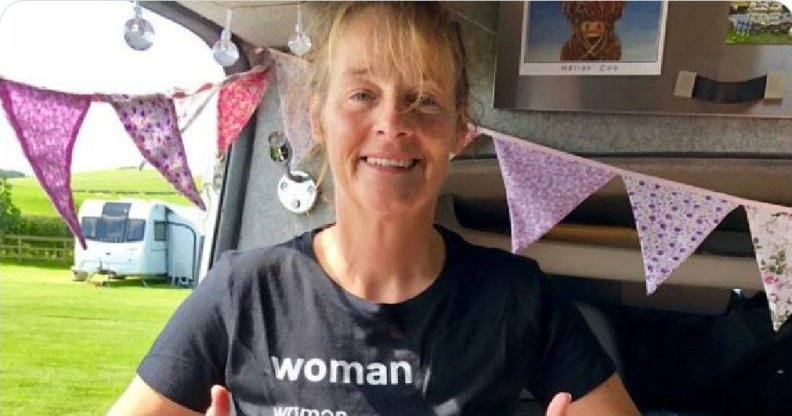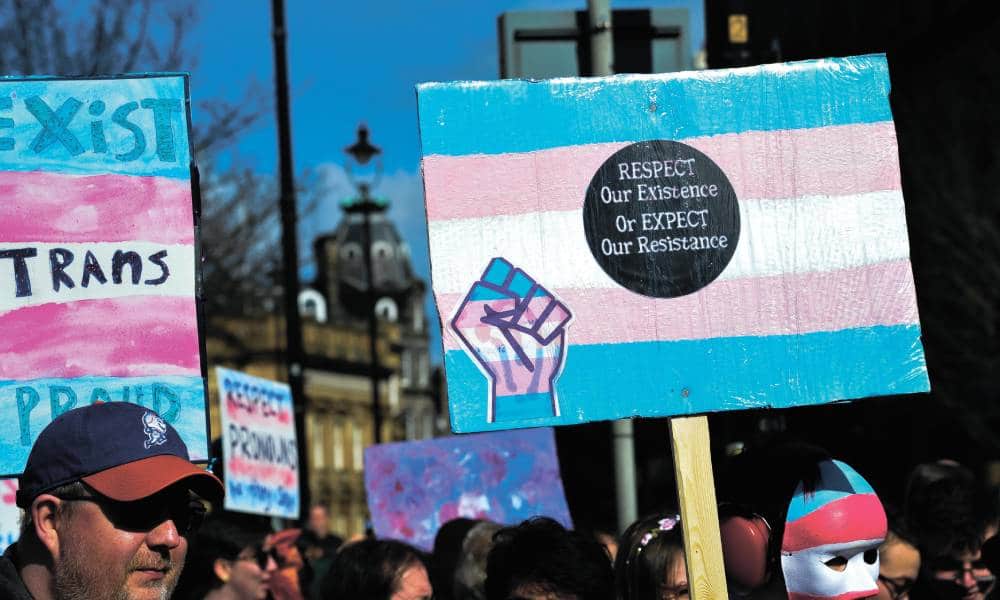Scottish Alba councillor launches ‘appalling’ attack against trans youth compared to ‘Section 28’

Caroline McAllister in a T-shirt sold by an anti-trans campaigner. (Twitter)
A Scottish Alba Party politician has launched an attack against trans youths being supported in a council motion dubbed “appalling” by activists.
Caroline McAllister, a councillor for the West Dunbartonshire Council just west of Glasgow, submitted the motion Thursday (27 January).
McAllister was once a familiar face in the SNP known for leading a high-decibel backlash against reforming legal gender recognition for trans people.
She was the co-convener of the SNP Women’s Pledge, which launched in 2019 with a petition saying: “Women have the right to refuse consent to males in single-sex spaces or males delivering intimate services to females such as washing, dressing or counselling.”
The Leven Ward representative moved to Alba, a pro-independence party formed by former first minister Alex Salmond, last March.
Compared by some activists to “Section 28“, a loathed law that banned the “promotion” of LGBT+ lives by schools and local authorities for more than a decade, McAllister’s recent motion takes aim at the government’s guidance on schools to support trans pupils.
An absolutely horrifying motion has been submitted to @WDCouncil by (surprise, surprise) Alba councillor Caroline McAllister. Make no mistake: this is the ideology of Section 28.
Surely councillors will reject the motion? pic.twitter.com/crE9eMXwOb
— James McEnaney (@MrMcEnaney) January 28, 2022
Making Scotland one of the first European countries to have government guidance on supporting trans students, education secretary Shirley-Anne Somerville unveiled the non-statutory guidance last year, a move welcomed by trans advocates.
Schools should “provide support and listen” to trans youth, the advice states, as to deny them this would be “detrimental” to their wellbeing. In short, it stresses how simply respecting trans teens’ pronouns and ensuring equal access to spaces can go far.
After all, LGBT Youth Scotland found that more than eight in 10 trans youth have been bullied and 29 per cent left education altogether to escape hate-filled learning environments.
Alba councillor says teachers do not have the ‘expertise’ to support trans teens
But McAllister said such guidance should not be followed, she wrote in a motion submitted ahead of a council meeting next on 9 February, according to an agenda document.
The motion states that teaching staff “may not have the skill set or expertise, to support a child with these complex issues and are instructed to affirm school children’s ‘gender identity'”. She wrote that trans people accessing bathrooms and changing rooms that align with their gender removes “girls the right to privacy and dignity”.
McAllister described current government guidance as “yet another sign of Government’s overreach into family life by excluding parents in this serious matter”.
“As non-statutory guidance, this places headteachers and schools at risk of lawsuits as well as eroding parents’ confidence and trust in teaching staff.”
The motion continues. “Affirmation without sensitive, appropriate, age-related, expert talking therapies has serious implications for individual children who may be unhappy or distressed about other underlying issues.”
McAllister claimed that “more and more evidence” is emerging around youth coming to “regret” transitioning down the line.
“Research shows that children and young people who are put on puberty
blockers, an experimental treatment,” McAllister added, “go on cross-sex hormones, whereas young people who are sensitively and expertly supported through puberty grow out of their distress and desist, often realising as they mature that they are gay
and not trans.”
Puberty blockers are life-saving, studies have found, and access to the well-studied drugs greatly reduces trans young people’s likelihood of trying to die by suicide.
And more evidence is certainly emerging that shows that just less than one per cent of trans people experience transition-related regret or detransitioned. Such regret, even more research has shown, is more often down to unsatisfactory results rather than regretting transitioning itself.

Hundreds of members of the LGBT+ community marched through Dundee as part of Trans Pride Scotland 2019. Stewart Kirby/SOPA Images/LightRocket via Getty Images)
Dentranistioning, meanwhile, doesn’t necessarily mean the person “regretted” the decision, further research has shown. To learn that the person no longer identities as trans or feels they are a different gender is, as Stonewall says, a realisation many could not have come to without taking the path they did.
Instead of the government’s recommendation, McAllister advised the Education Department to consider guidance from anti-trans groups such as Transgender Trend.
She added: “Council is fully committed to ensuring all children and young people do not face discrimination or prejudice in their school life and calls upon the Education Department to explore other LGBT School Guidance available that ensures dignity and respect for all pupils.”
McAllister sought to stress that the council is “committed to equality law” and is levelling “concerns expressed by parents” around the guidelines.
Colin Macfarlane, the director of Stonewall’s Scottish branch, said the motion is “grim”.
This is grim. Every young person, including LGBTQ+ young people, should feel safe and included in school. Sincerely hope that Cllrs at @WDCouncil will see this for what it is and resoundingly reject it. https://t.co/xjIx4qwPW9— colin macfarlane (@Cmacf76) January 28, 2022
“Every young person, including LGBTQ+ young people, should feel safe and included in school,” he tweeted.
“Sincerely hope that councillors at West Dunbartonshire Council will see this for what it is and resoundingly reject it.”
The Equality Network, one of Scotland top LGBT+ advocacy groups, urged the council to abandon the motion.
Appallingly transphobic motion which we very much hope @WDCouncil will firmly reject… https://t.co/cQZY2JMno0— Equality Network (@LGBTIScotland) January 28, 2022
“Appallingly transphobic motion,” the organisation tweeted Friday, “which we very much hope West Dunbartonshire Council firmly reject…”
PinkNews contacted West Dunbartonshire Council for comment.

